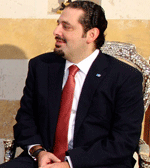BEIRUT — Saad Hariri, Lebanon’s prime minister-designate, is stepping down just 10 weeks after being asked to form a unity government.

|
|
Lebanon’s President Michel Suleiman (L) meets with prime minister-designate Saad al-Hariri at Beiteddine palace in Beiteddine village, Mount Lebanon September 10, 2009. Hariri said on Thursday he was stepping down after more than 10 weeks of trying to form a unity government with opposition groups including Hezbollah. REUTERS/Dalati Nohra /Handout |
“I announce to all Lebanese that I told President Suleiman today that I will step down from forming a government, in the hope that this decision will be for the benefit of Lebanon,” Hariri said after a meeting with Michel Suleiman, the president.
The March 14 alliance leader has been trying to broker a consensus over the distribution of the country’s 30 ministerial posts since June.
Hariri said on Thursday that the conditions set by the Hizbullah-led bloc sought to undermine the entire election, which his Western-backed coalition had clearly won.
Under Hariri’s proposal, his alliance would have had 15 seats in the cabinet, the Hizbullah-led minority would have 10, and Suleiman would pick the remaining five.
However, the opposition quickly dismissed the planned make up and put forward its own alternative proposal.
“We have to read this resignation as part of a very tough bargaining process between the majority led by Saad Hariri and the opposition which includes Hizbullah and the movement led by Michel Aoun,” said Paul Salem, director of the Middle East Centre at the Carnegie Endowment for International Peace.
“Both have had really strong demands with respect to the formation of the government. This pushes the issue into more complex territory.
“Lebanon’s political bargaining is always very complex and fairly arcane. It’s always difficult to form a government.
“But the resignation of Hariri raises the issue of government formation in Lebanon to an international platform and with some regional diplomacy it can be brought back on track.”
One of the most contentious points during the negotiations was the demand by Hizbullah and its allies that Jibran Bassil, of the Hizbullah-ally Christian Free Patriotic Movement, stay on as communications minister.
Hariri rejected this, reportedly choosing a politician closer to his own bloc for the post, Ghazi Aridi of Druze politician Walid Jumblatt’s Progressive Socialist Party.
Suleiman is now expected to hold consultations with MPs to designate a new prime minister, but with the March 14 alliance holding the majority in parliament Hariri’s mandate could simply be renewed.
—Al Jazeera






Leave a Reply